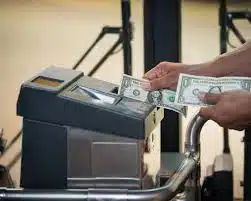Keep the Cash Option When Paying Fares
August 18, 2021 | Susan De Vos

As we emerge from the COVID-19 pandemic, we must prioritize confronting ongoing challenges, including housing affordability, transit access, and resiliency in the face of a changing climate. -- From April 13, 2021 memo to city Department on Division Heads on Proposals for the 2022 Capital Budget (https://www.cityofmadison.com/finance/documents/budget/2022/capital/CapitalMayorMessage.pdf; bold added)
How accessible would you consider the transit system if a new or occasional would-be bus rider were denied a bus ride because she/he/they tried to pay the fare in cash? Madison's Metro Transit just temporarily suspended its recommendation that its fare collection go cashless. For how long is anyone's guess. It had been proposing for months that fares for a new Bus Rapid Transit line be cashless from the outset and that the regular buses go cashless within five years.
That is wrong. Metro must keep a cash option. The Money Conundrum How better to cut expenses than to move to a cashless system? Managing cash payments is expensive compared to processing electronic-based payments. Even the 'simpler' vending machines for pre-board cash payment cost $10,000-$20,000 each while machines dispensing multi-use cards could cost $40,000-$60,000 each. Replacing fareboxes currently on local buses when they reach the end of their life would cost millions more. All this while much of the world is increasingly going cashless, not just by using credit/debit cards, but by using electronic apps such as Zelle, PayPal and Venmo or Mobile payment services such as Apple Pay and Google Pay. However, while going cashless might be better for Metro, it would not be better for potential bus riders. And bus riders are the main reason Metro exists. Drawbacks to Going Cashless Include But Are Not Limited to Equity Issues Is it any surprise therefore to find that major public transit systems all across the United States including in San Francisco, Minneapolis, Milwaukee, Chicago and Washington D.C. have adopted fare schemes that encourage cashless payment but also maintain the cash option? Indeed, to pass the extra cost of managing cash payments on, the San Francisco agency (SFMTA) exacts a surcharge of 50¢ when paying in cash, the Milwaukee agency (MCTS) 25¢. Equity Mitigations One "equity mitigation" is to enable cardholders to hold a negative balance on their Metro account. Metro acknowledges the need for a lower bound but does not suggest what it might be. A second "equity mitigation" is to have a special low income fare. Metro is currently limited to issuing 450 31-day low income passes each month. Passes are only available for purchase on a weekday until 4:30 p.m. at one of three locations (Metro Transit Admin. Office, Dane County Job Center, City of Madison Treasurer's Office). Eligible riders must 1) self-certify that their income is at or below 150% of the national poverty line; 2) show a Low Income Pass Eligibility Card at time of purchase; or 3) show a valid QUEST card. However, the whole idea of means testing is itself fraught with equity issues ("a program just for the poor is a poor program." - Wilbur Cohen). A third "equity mitigation" would be to establish a wide network of retail outlets where riders could load balances onto smart cards. Outlet locations would not necessarily be intuitive however unless they could be at all outlets of a certain kind such as grocery stores. Rather, if outlets had to be posted on the Internet, that knowledge would not be known without an Internet connection. If someone works odd hours, the outlet would need to be open at those hours as well. Finally, it is good to remember that many people use cash because they do not have a large sum of money at any one time. Consequently, they may have to visit the retail outlet frequently to use this feature. If Metro is charged for every transaction the outlet makes, this option could end up being costly. A fourth "equity mitigation" could be to install ticket vending machines all around the city. The initial cost of one such machine would be $10,000-$20,000 and the machines are notorious for malfunctioning in one way or another. Their maintenance could end up being quite costly. Again, no estimated cost is attached to this potential policy. A fifth "equity mitigation" is fare capping. Fare capping might be the simplest way to make fares fairer in an account-based system. In Madison, the regular 31-day unlimited ride pass now costs $65. That translates into $2.10 a day or $14.70 a week. If Metro capped fares, any use of the bus beyond the cap would be "free," negating the need to get a ride from a family member, neighbor or co-worker as a way to avoid paying a fare. Credit toward capping cannot be accrued when someone pays cash in a farebox but neither would paying cash in a farebox hamper the option of enacting a fare-capping policy. Non-Equity Drawbacks of Going Cashless Privacy Concerns "While cashless systems do offer convenience, care must be taken to ensure that Personally Identifiable Information (PII) is handled properly so that passenger information does not fall into the wrong hands." (Hadj-Chikh et al., n.d.) Safety Safety is an issue when someone has to carry the cash necessary for reloading a smart card account. Technology Glitches What happens if the phone freezes or loses battery power when it needs to work? "When technology does not cooperate, we can’t quickly determine whether or not someone paid the fare" (Hadj-Chikh et al., n.d.) Conclusion There are major equity issues involved with going cashless because some people cannot or do not bank electronically. Other serious drawbacks to a cashless system include it being a potential barrier to visitors, first-time or occasional would-be transit users; privacy concerns; safety concerns; and technology glitches. An equity-enhancing policy such as "fare capping" could bring us closer to where we want to be with an account-based system without necessitating the elimination of a cash option. |